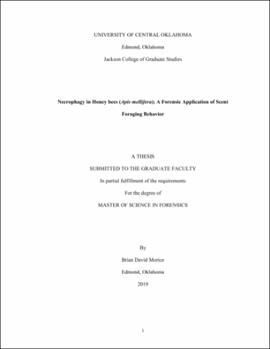| dc.contributor.advisor | Lord, Wayne | |
| dc.contributor.author | Morice, Brian David | |
| dc.date.accessioned | 2020-07-09T14:41:01Z | |
| dc.date.available | 2020-07-09T14:41:01Z | |
| dc.date.issued | 2019 | |
| dc.identifier.other | (AlmaMMSId)9982665785302196 | |
| dc.identifier.uri | https://hdl.handle.net/11244/325104 | |
| dc.description.abstract | Scent training and field detection trials were conducted to determine if honey bee (Apis mellifera) foraging behavior could be employed as a practical application in the location of vertebrate carrion for use in interdiction and recovery efforts of illegally trafficked wildlife. Resource recognition and querying trials consisted of two components. Honey bees were trained to associate chemical compounds found in decaying tissues with a high-quality food source via introduction of the compounds into a sugar solution. Randomized scented and non-scented sugar solution choices were subsequently provided to hived bees at varying distances within a rural outdoor study area. Following initial forager recruitment by scouts, twice the number of bees were observed feeding at carrion-scented stations. Additional field trials performed using wildlife carrion reinforced experimental results. Scent trained scout bees showed a marked interest in decomposing wildlife remains by aerially investigating and landing on the carrion. These findings demonstrate honey bee retention of carrion sensory recognition capabilities and support the cabronid wasp theory of honey bee evolutionary origins. Applications for forensic remains detection, wildlife trafficking interdiction, and endangered species conservation are indicated. | |
| dc.rights | All rights reserved by the author, who has granted UCO Chambers Library the non-exclusive right to share this material in its online repositories. Contact UCO Chambers Library's Digital Initiatives Working Group at diwg@uco.edu for the permission policy on the use, reproduction or distribution of this material. | |
| dc.subject.lcsh | Honeybee | |
| dc.subject.lcsh | Animals | |
| dc.subject.lcsh | Animal carcasses | |
| dc.subject.lcsh | Forensic sciences | |
| dc.title | Necrophagy in honey bees (Apis mellifera): a forensic application of scent foraging behavior | |
| dc.type | Academic theses | |
| dc.contributor.committeeMember | Barthell, John | |
| dc.contributor.committeeMember | Jourdan, Thomas | |
| dc.thesis.degree | M.S., Forensic Science | |
| dc.subject.keywords | Apis mellifera | |
| dc.subject.keywords | Carrion | |
| dc.subject.keywords | Foraging | |
| dc.subject.keywords | Necrophagy | |
| dc.identifier.oclc | (OCoLC)1111628558 | |
| uco.group | UCO - Graduate Works and Theses::UCO - Theses | |
| thesis.degree.grantor | Jackson College of Graduate Studies. | |
